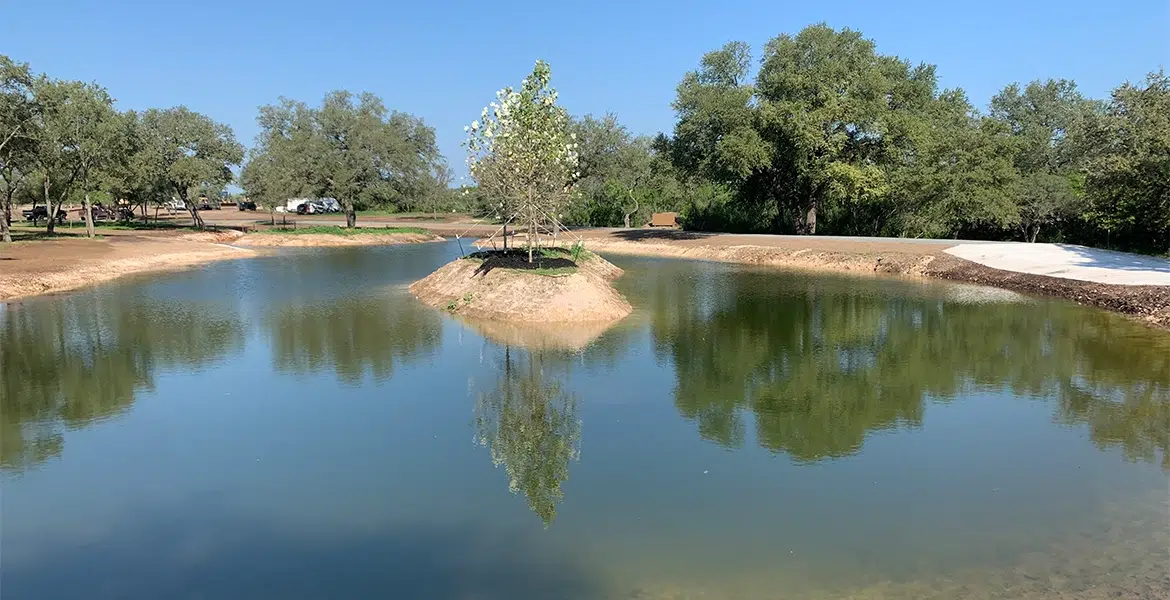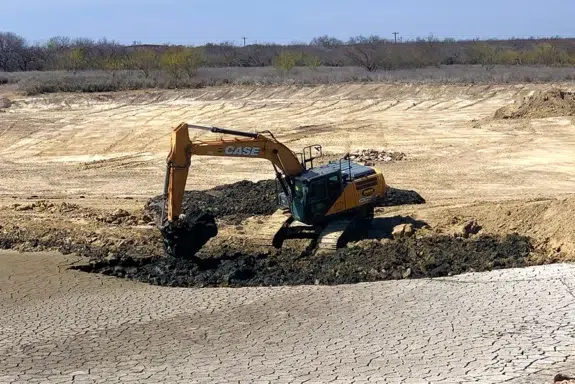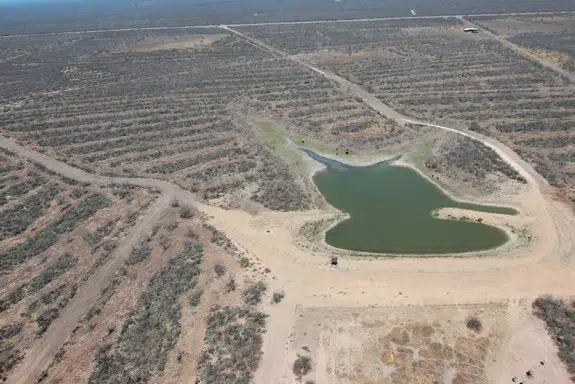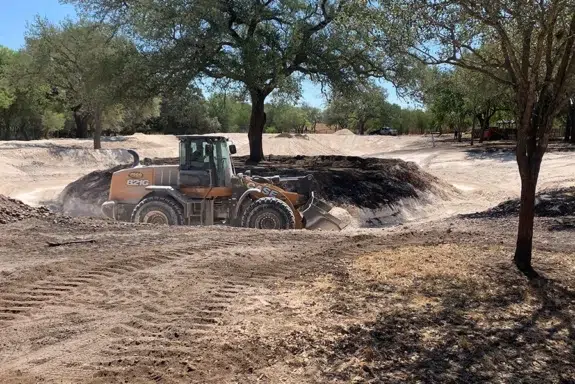
Choosing between lake digging and pond building is an important decision that can impact the functionality and aesthetics of your property. Whether you envision a serene water feature for personal enjoyment or a lake for recreational activities, understanding the differences between lake digging and pond building can help you make the best choice for your land. At Flying G Excavation, our experienced pond and lake builders are here to guide you through the process, ensuring that your project fits your unique needs.
Before diving into the benefits and considerations of each option, it is important to define what sets lakes and ponds apart.
- Lakes are generally larger, deeper bodies of water, often taking up multiple acres. They can support aquatic life and recreational activities like boating, fishing, and swimming.
- Ponds are smaller, typically less than one acre in size, and shallower than lakes. They are usually built for more specific purposes, such as irrigation, livestock watering, or aesthetic landscaping.
While “lake” and “pond” are often used interchangeably, the choice between lake construction and pond building depends on your property size, intended use, and maintenance capacity.
Benefits of Lake Digging
Opting for lake digging brings a host of benefits that go past aesthetics. Here’s why lake digging might be the right choice for your land:
- Versatility in Use: A lake offers greater versatility compared to a pond. With a larger surface area and depth, lakes can accommodate activities like fishing, kayaking, and even small-scale boating. For property owners who desire a multi-use water feature, a lake is an ideal choice.
- Enhanced Property Value: A professionally dug lake, along with brush clearing, can significantly increase the value of your property. Potential buyers are often drawn to the allure of waterfront property, making your land more appealing in the real estate market.
- Improved Wildlife Habitat: Lakes support a broader range of wildlife, including fish, birds, and amphibians. If you’re interested in creating a natural habitat that attracts diverse species, lake digging can help achieve that goal.
- Greater Water Volume and Depth: Lakes hold larger volumes of water, which helps maintain water quality and reduces the impact of seasonal fluctuations. Deeper lakes are also less prone to issues like algae blooms, making them easier to maintain over time.
- Aesthetic Appeal: A lake adds a grand, scenic element to your property that a pond cannot match. The expansive water body creates a stunning focal point, enhancing the landscape.
Considerations for Lake Digging
While lake digging offers numerous advantages, there are several factors to consider before committing to the project:
- Space Requirements: Lake digging requires substantial land space, making it suitable only for larger properties. You’ll need to ensure that your land can accommodate the size and depth of a lake.
- Regulatory Permits: Large-scale lake digging often requires permits and environmental impact assessments. At Flying G Excavation, we can help with these requirements and ensure your project complies with local regulations.
- Maintenance: Maintaining a lake involves more effort compared to a pond. Aeration, water quality testing, and aquatic plant management are essential tasks that help keep your lake healthy and vibrant.
Benefits of Pond Building
Pond building offers a more accessible, budget-friendly alternative to lake digging. Here’s why you might choose to build a pond instead:
- Cost-Effective: Ponds are generally less expensive to construct than lakes. The smaller scale of excavation and lower material requirements make pond building an attractive option for property owners on a budget.
- Smaller Footprint: A smaller pond makes it easier for properties, including residential backyards, farms, and commercial landscapes. Ponds can fit almost any space, offering flexibility in terms of location and land clearing services.
- Specific Uses: Ponds are often built for targeted purposes such as irrigation, livestock watering, or fish farming. For agricultural properties, a pond can be a highly functional feature that supports daily operations.
- Easier Maintenance: With shallower depths and smaller surface areas, managing algae growth and water quality changes is more straightforward.
- Customization: Ponds offer great customization potential, allowing property owners to add elements like waterfalls, fountains, or decorative landscaping. This makes ponds an excellent choice for enhancing the aesthetic appeal of a garden or outdoor living space.
Considerations for Pond Building
While pond building is generally simpler than lake digging, it’s not without its challenges:
- Limited Recreational Use: Ponds are not ideal for activities like boating or swimming. Their smaller size and shallower depths limit the range of recreational opportunities they can provide.
- Prone to Seasonal Changes: Ponds can be more susceptible to seasonal changes, such as temperature fluctuations and evaporation. These factors can impact water quality and aquatic life.
- Potential for Overcrowding: Due to their smaller size, ponds can quickly become overcrowded if stocked with too many fish or aquatic plants. Proper management is essential to maintain balance within the ecosystem.
Working with a Professional Lake Builder
Choosing between lake digging and pond building depends on your needs, budget, and property characteristics. Lakes offer greater versatility, aesthetic appeal, and increased property value, while ponds provide a cost-effective, customizable solution for smaller spaces. Consulting with a professional lake builder can help you weigh the pros and cons, guiding you toward the best decision for your land. Whether you want a sprawling lake or a charming pond, Flying G Excavation is here to bring your water feature dreams to life. Contact us today or call 830.445.4555 to discuss your project with our experienced team of lake builders.





